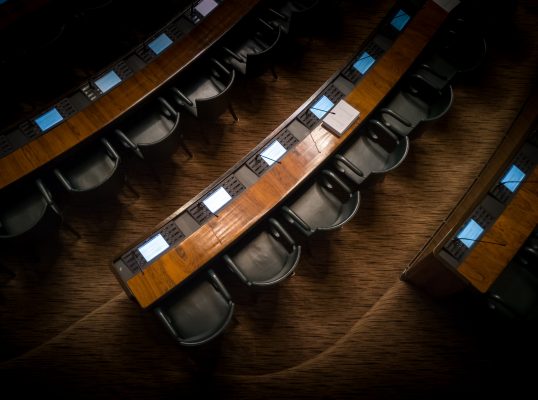March 18, members of Azerbaijan’s National Parliament approved proposed amendments to the law on Information, Informatisation and protection of Information during the first reading.
A special clause “information-telecommunication network” and “information-telecommunication network users” were added to article 13.2. of the law. While there are is no definition of what the “information-telecommunication network [and its users]” clause actually means, some media experts and journalists suggested this referred to social media platforms and the users. In Azerbaijan, the Ministry of Transportation, Communication and High Technologies already holds broad powers to block websites, without a court order. If these recent suggestions to the law are approved in the final reading, it would further deteriorate freedom of speech online as social media users, posting content the Ministry may deem as misinformation may be arrested and face charges.
One parliament member, Ganira Pashayeva, even suggested setting up a special unit that would monitor social media platforms, and hold those spreading rumors accountable.
On March 21, Ilgar Atayev was called in for questioning and charged with article 388.1 of the code of administrative offenses – sharing of prohibited information on the Internet or Internet – telecommunication networks. According to Meydan TV, an independent online news platform, although Atayev was informed that the charges were sent to court, he does not know what he is facing.
Authorities claim, Atayev, shared information on COVID without quoting official sources and that shared information was false.
The Law on Information, Informatisation, and Protection of Information
This law was first adopted in 1998. On March 10, 2017, a series of restrictive amendments were added to the law, converting the law from a technical regulation into content regulation:
- article 13.1.3. create conditions for the regulation of the domain names not with participation of the parties of the internet community, but by relevant Ministry, which contradicts international norms, including ICANN recommendations in this regard;
- article 13.2.3, all legal and ethical issues previously existing in various laws have been listed as prohibited information and it has been stressed that their dissemination is prohibited;
- article 13.2.4, when the owner of the Internet information resource and its domain name posts the information, dissemination of which is prohibited or receives an application about that piece of shared information, it guarantees the removal of such information from the information resource;
- article 13.2.5, when a hosting provider reveals in its information systems some information, dissemination of which in internet information resources is prohibited or receives information about it, it should undertake immediate measures for its removal by the owner of the information resource;
- article 13.3.3, in cases of existence of real threat for the lawful interests of the state and society or in urgent cases when there is a risk for life or health of people, the access to internet information resource is temporarily restricted directly by the Ministry of Transport, Communications and High Technologies [restriction is applied without a court order. Although an application is made to the court, the decision to close down the online information source remains in force until the court handles the case or the decision is annulled.]
- article 13.3.6, describes the List of information resources that are “blocked” which is curated and maintained by the Ministry [to this day, no such resource exists however, AIW has a list of online resources that are regularly monitored relying on OONI for blocking]. Independent legal experts believe, this kind of authority is restrictive in nature. Especially as it forces all host and Internet providers are imposed an obligation to prevent access to these resources.
According to the law, the Ministry of Transport, Hich Technologies and Communication is the executive authority deciding on the type of information that is relevant, which websites get blocked and what information must be removed and so on.
